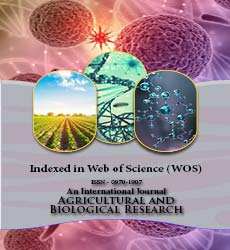Agricultural and Biological Research
RNI # 24/103/2012-R1
Samuel Shiferaw Dasa and Yohannes Shifera Daka*
Agriculture is a science and art of producing crops and rearing animals. It supports the world populations even though highly affected by climate change and variability. Therefore, promoting climate smart agriculture is the solution. Climate Resilience Green Economy (CRGE) fast track project implemented crops and livestock production through climate smart agriculture in the study area. However, no study has evaluated the effect of climate smart agricultural practices or livelihoods of the farmers. This research had the aim of identifying crop and animal production adaptation options and assessing adaptation competence of respondents. In this study, 237 samples households (HHs) were selected and stratified by proportionality allocation to sample into CRGE participant (102 HHs) and non-CRGE group (135 HHs). Data was collected from household survey, key informant and focus group discussions and meteorological data also obtained. The results of 20 years’ trends (1998-2017) of rainfall show that erratic rainfall trends while the temperature was increasing. Crop and animal production income, adaptation level of respondents before and after project and Non-CRGE group mean income in Ethiopian Birr (ETB) was identified. The mean income of HHs before CRGE project was 5,726.10 ETB and after project was 12,943.00 ETB and increased by 7,217.20 ETB. And mean income of non-CRGE group in 2012-2014 and 2015-2017 were 5238 ETB and 5502.5 ETB respectively and increased by only 264.50 ETB. Therefore, the average income due to CRGE fast track investment among CRGE participants was increased by 6952.70 ETB when compared with non-CRGE group. For the reason, adaptation capacity of CRGE fast track participants also increased. Finally, CRGE fast track investment needed for immediate response of adaptation and to diversify source of income. Therefore, promoting CRGE fast track is important since it promotes climate smart agriculture among small holders.
